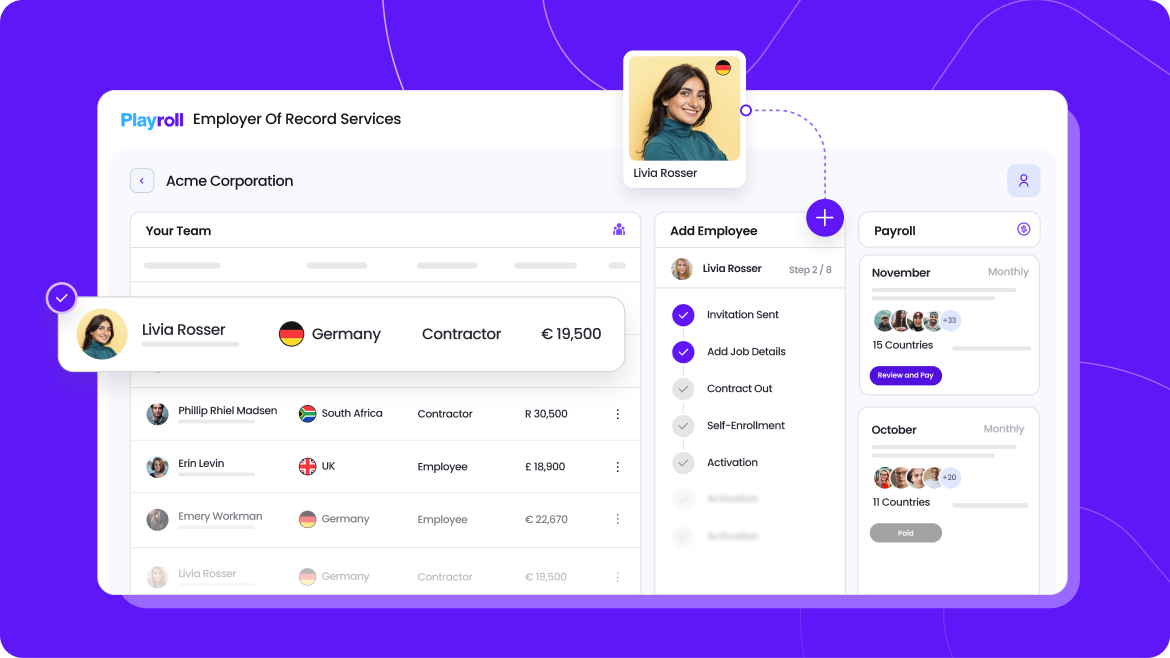Copied to Clipboard
Ready to get Started?


Key Takeaways
Successful global expansion requires defined objectives, market research, and a scalable plan tailored to each region.
Companies must localize products, operations, and culture to meet the unique legal, cultural, and customer needs of each market.
Partnering with an Employer of Record like Playroll removes compliance, payroll, and hiring obstacles so businesses can expand faster and with less risk.
Global expansion is no longer a privilege reserved for Fortune 500 giants with deep pockets. Thanks to digital-first business models, eCommerce, and borderless collaboration tools, expanding internationally is firmly within reach for all companies. Whether you’re a startup chasing new revenue streams or an established business ready to test foreign markets, the right global expansion strategy can be your gateway to growth.
Still, entering foreign markets brings complexity. Every country has its own local laws, regulatory compliance requirements, tax systems, and cultural dynamics you need to know before you can succeed. This is where an Employer of Record has transformed the landscape. By managing payroll, benefits, and compliance on your behalf, an EOR allows you to expand globally with speed and confidence – without the heavy upfront investment of establishing entities in each new region.
Businesses that approach international expansion with a clear, and scalable strategy have the potential to gain an edge. With the global economy forecasted to grow by 3.0% in 2026 and 3.1% in 2026, now is the time to turn global expansion from an aspiration into a sustainable growth strategy. In this guide, we’ll share practical steps on how to get it right.
What is Global Expansion?
Global expansion is the deliberate move a business makes to grow beyond its domestic market and establish a presence in foreign markets. Done right, it’s a growth strategy that opens doors to new customers, broader talent pools, and fresh revenue opportunities. Expanding has the added benefit of spreading your risk across multiple markets and unlocking economies of scale.
If you’re considering expanding globally, you’ll need more than ambition. Your team will need to adapt to local culture, comply with labor and tax laws, and design operations that work across different regulatory and economic systems. A strong global expansion strategy balances opportunity with compliance, ensuring that your business will stand out and sustain growth within them.
Key Benefits of Global Expansion for SMBs
When you invest in a clear global expansion strategy, your company adds more than just a new market to your portfolio.
Here’s what you and your team stand to gain:
The benefits of global expansion include:
- Revenue Diversification: Spreading income across regions means you don’t rely on a single domestic market and will protect your business from local downturns.
- Access to New Customers: More customers means greater sales potential and a larger overall market share.
- Access to Global Talent Pools: Hiring internationally connects your business with specialized skills and expertise that may be scarce at home. Local talent also brings unique market knowledge and cultural insights that give you an edge.
- More Innovation: Exposure to diverse talent markets encourages your team to adapt and think differently. New perspectives fuel creativity in product design, services, and customer experience.
- Operational Efficiency at Scale: Operating across multiple markets allows you to spread fixed costs like technology, logistics, and R&D. This creates cost efficiencies and helps you stretch every investment further.
- Stronger Competitive Advantage: Establishing a global presence boosts brand recognition and credibility. It signals to customers, partners, and investors that your business is built for long-term growth.
- Increased Investment Appeal: Investors favor companies with global reach because it demonstrates scalability and reduced risk. A strong international footprint can open doors to funding and partnerships.
- Supply Chain Flexibility: Global expansion allows you to diversify sourcing and production across regions. This reduces dependency on one market and builds a more reliable supply chain.
- Closer to Target Markets: Being present in international markets puts you closer to customers. It allows you to adapt quickly to local needs and build stronger relationships on the ground.
Types of Global Expansion Models
There’s no “one-size fits all” when it comes to a winning global expansion strategy – rather, it should match your company’s goals, resources, and risk tolerance. Here are the most common models to consider:
- Licensing and Franchising: For a fee, you grant rights to a foreign business to use your company’s trademarks, patents, or intellectual property. This allows you to expand internationally with relatively low investment while maintaining some control over your brand.
- Mergers and Acquisitions (M&A): With this model, your business would merge with or acquire an established company in your new target market. This gives you immediate access to their supply chains, distribution networks, and customer base. However, it requires significant capital and integration planning.
- Exporting: You sell your products directly to international customers or indirectly through local intermediaries. Exporting is a cost-effective way to test new markets without establishing a physical presence abroad.
- Joint Ventures and Strategic Alliances: Form a partnership with a local company to share resources, expertise, and costs. This approach helps you overcome barriers like local regulations or language while reducing financial risk.
- Foreign Direct Investment (FDI): You establish wholly-owned subsidiaries or build operations from the ground up (known as greenfield ventures). This gives your business full control in the target market, but requires significant financial resources and long-term commitment.
- Partnering With an EOR: You work with an EOR like Playroll to handle hiring, compliance, benefits and payroll in your target market. This lets you expand quickly, hire local talent, and test new regions at a fraction of the cost of setting up your own entities.
How to Build a Global Expansion Strategy in 5 Steps
There are plenty of international expansion strategy examples out there, but the essentials don’t change. Think of your global expansion strategy as a body: the skeleton is the structure you can’t live without, while the muscles are the processes and optimizations you’ll build on top as you grow stronger.
Here are five steps your business can’t skip when expanding internationally:
1. Define Objectives, Assess Readiness, and Prove Feasibility
Like any good plan, setting up your global expansion strategy should start with defining specific, measurable goals. Without clarity, you risk chasing opportunity for opportunity’s sake, spreading resources too thin, and failing to prove value in any single market.
Don’t Just Default to Vague Aspirations
It’s tempting to set a goal like “we want to expand into Europe” or “we’ll open an office in Asia.” These broad ambitions may sound bold, but they lack the precision needed to guide decision-making or measure success.
Common problems:
- You can’t tell whether the expansion is working.
- Teams struggle to prioritize resources.
- Leadership quickly loses patience if results aren’t clear.
Anchor Your Objectives in Data and Frameworks
Use the S.M.A.R.T. framework (Specific, Measurable, Attainable, Relevant, Time-bound) to turn your ambition into direction:
- Specific: “Launch our SaaS platform in Germany,” not “expand to Europe.”
- Measurable: “Close 200 new enterprise seats in Year 1,” not “grow the customer base.”
- Attainable: “Hire a local team of five,” not “replicate our entire HQ structure.”
- Relevant: “Enter Germany to meet EU compliance needs,” not “because competitors are doing it.”
- Time-Bound: “Launch by Q3 2026,” not “when we’re ready.”
Why This Matters in Practice
Different businesses will have goals specific to their industry type and naturally your expansion strategy should support these goals. Trying to replicate another business’s strategy just because it worked for them would be a mistake. Here are a few examples of how goals can differ across industries and business types:
- A SaaS company might aim to win 15% of total revenue from European clients within 18 months, anchored to GDPR compliance as a strategic advantage.
- A consumer goods brand could target doubling its customer base in Latin America, with a 12-month goal to achieve 20% incremental revenue from that region.
- A manufacturer might decide to move 30% of production to Vietnam within nine months, with a defined target to reduce costs by 20%.
Readiness Comes Next
Once objectives are set, ask whether your business has the capacity to support them. Do you have 12–18 months of financial runway for expansion? Can your supply chain deliver at the required SLAs? Is your product localized enough to meet cultural and regulatory expectations? These readiness checks prevent cracks forming in your domestic model.
Finally, Prove Feasibility
Run small, evidence-driven tests:
- Launch local-language landing pages and measure conversions.
- Run paid campaigns to validate demand and pricing assumptions.
- Interview 15–20 people that fit into your ideal customer profile to stress-test your value proposition.
- Map competitors’ pricing, positioning, and customer relationships to define what your first foot in the door will be.
2. Build Local Partnerships and Networks
Going global doesn’t mean going at it alone. The fastest way to gain traction in any new market is to work with people who already understand the terrain. Local partnerships give you access to cultural knowledge, regulatory shortcuts, and existing distribution networks that would take years to build on your own.
Don’t Just Default to Going Solo
Although you might believe you can replicate your domestic model abroad without local help – build your own sales channels, run your own operations, and learn the rules as you go. But in most markets, this approach wastes time, burns cash, and risks reputational missteps you may not recover from.
Common Problems:
- You miss crucial cultural cues and consumer preferences.
- You underestimate the time and cost of navigating regulations.
- You fail to gain trust in markets where relationships drive business.
Build Strategic Partnerships Instead
Working with local players gives you an insider’s advantage:
- Market Insight: Local distributors, suppliers, or advisors help you understand how business really gets done.
- Regulatory Navigation: Experienced partners guide you through permits, tax compliance, and labor laws faster than trial-and-error.
- Access to Networks: Partnerships plug you into ready-made supply chains, customer bases, and marketing channels.
What This Looks Like in Practice
- A food brand entering Asia might work with a regional distributor who already supplies supermarket chains, bypassing years of relationship-building.
- A SaaS company expanding to the Middle East might partner with a local systems integrator who has credibility with government clients.
- A consumer goods retailer launching in Latin America might collaborate with local e-commerce platforms to accelerate adoption.
Don’t just sign with the first company that offers to help. Define what you need, everything from distribution, compliance expertise, marketing reach, and then vet potential partners for reputation, alignment, and reliability. The right partnership multiplies your impact; the wrong one can stall your expansion entirely.

3. Adapt to Local Markets: Culturally, Legally, Seasonally
Some of the biggest corporations with huge marketing budgets and decades of experience in their respective businesses have failed to expand into global markets because they’ve failed to pay attention to the nuances of their new customer base. Every market has its own cultural expectations, legal frameworks, and seasonal rhythms.
Shift and Adapt Over Copy and Paste
If you don’t adapt, you risk being seen as out of touch, or worse, non-compliant. Customers will notice when your offering doesn’t reflect their needs, and regulators notice when you cut corners.
Common Problems:
- Customers feel your product isn’t built for them.
- Messaging falls flat or even offends local audiences.
- Regulators block you for non-compliance.
Instead, Localize and Comply
- Language and Culture: Translate accurately and adapt your messaging, not just your words. Respect local customs, symbols, and buying behaviors.
- Legal Compliance: Ensure contracts, employment terms, payroll cycles, and tax filings follow local laws.
- Seasonality: Account for holidays, weather patterns, and buying cycles that differ from your home market.
What This Looks Like In Practice
- Netflix adapts globally by producing local-language shows, not just exporting U.S. content.
- A U.S. SaaS firm entering Europe must prioritize GDPR compliance and EU data residency requirements.
- Retailers entering the Middle East often adjust launches and promotions around Ramadan, when consumer behavior shifts dramatically.
4. Leverage Technology for Speed and Efficiency
Expanding internationally doesn’t have to mean building massive teams or opening offices in every country. With the right tech stack, you and your team can run global operations, pay people anywhere, and reach new customers, all without the overhead of a multinational.
Don’t Get Stuck in Manual Mode
Some companies still try to manage payroll spreadsheets in multiple currencies, track compliance manually, or rely on fragmented tools that don’t talk to each other. It slows everything down and magnifies risk.
Common Problems:
- Payments are delayed or inaccurate.
- Compliance errors snowball into fines.
- Leaders waste energy on administration instead of growth.
Use Technology As Your Backbone
- SaaS Platforms: Automate payroll, HR, compliance reporting, and workforce management across borders.
- E-Commerce Platforms: Use Shopify, Amazon, or Alibaba to test international demand with minimal upfront investment.
- Digital Marketing Tools: SEO, paid ads, and local social campaigns help you reach and convert customers faster.
What This Looks Like In Practice
- A startup can launch globally on Shopify with localized storefronts before investing in warehouses.
- A professional services firm can manage payroll across 10+ markets from a single dashboard.
- A consumer brand can run paid campaigns in-region to test product-market fit before hiring a single salesperson.
5. Scale Gradually and Monitor Progress
The best global strategies are iterative. Rather than trying to do everything at once, start small and build 1% at a time. It’s a cycle of testing, measuring, and scaling. Companies that try to do everything at once often burn out, while the ones that expand deliberately build sustainable global footprints.
Don’t Just Default To All-In Expansion
The temptation is to launch in multiple countries at once to “make a splash.” But more often than not, that stretches your team, capital, and operations too thin.
Common Problems:
- Poor product-market fit drains resources.
- KPIs become blurred across too many markets.
- Setbacks in one region spill over into others.
Scale Gradually And Measure Obsessively
- Pilot markets: Test your expansion in one or two countries first to validate demand and operations.
- Track KPIs: Define the metrics that matter e.g. revenue growth, customer acquisition cost, retention, compliance, and employee engagement.
- Refine and replicate: Use lessons from early markets to improve the playbook before you expand again.
Why This Matters in Practice
- A SaaS company might launch in Germany, test messaging and pricing, then expand to France only after refining.
- A retail brand could pilot an online-only entry in Japan before committing to brick-and-mortar investments.
- A manufacturer might trial a single production line in Vietnam to test supplier reliability before moving full operations.
Challenges in International Expansion & How to Overcome Them
Expanding internationally opens the door to new customers, higher revenues, and a stronger global footprint, but it also comes with challenges that can make or break your success. From navigating complex regulations to bridging cultural divides, global growth requires careful planning and expert execution.
Below are the most common hurdles companies face and how to overcome them.
Regulatory Complexity
Every country has its own legal and compliance framework, from labor laws to tax obligations. What works in one jurisdiction might put you at risk in another. If overlooked, missteps in payroll, benefits, or worker classification can trigger hefty fines, back-pay liabilities, and reputational damage. That’s why many companies are turning to EORs like Playroll to ensure contracts, benefits, and payroll stay compliant in every region.
Cultural Differences
What resonates with customers in one country may completely miss the mark in another. Beyond translation, cultural nuances shape how people perceive your brand, negotiate deals, and even interact in the workplace. Addressing cultural differences requires more than a multilingual website, it’s something that requires building trust. That means adapting product positioning, revisiting brand visuals, and training teams on cultural etiquette.
Supply Chain Management
Reliable logistics are essential to global expansion, but supply chains often become more complex as companies grow. Customs delays, infrastructure challenges, or geopolitical changes can disrupt even the best-laid plans. The solution is building flexibility into everything you do: diversifying suppliers, near-shoring where possible, and creating redundancy so operations can continue even if one route or partner faces disruption.
Talent Acquisition
Hiring the right people is one of the most important, and most difficult, parts of international expansion. Local regulations, competitive job markets, and cultural expectations around compensation all add layers of complexity. You’ll have to decide whether to hire locally, relocate members of your existing team, or engage contractors, all while ensuring compliance with local labor laws.
Financial Planning and Risk Management
Global growth succeeds when financial planning looks beyond short-term costs. From currency fluctuations to unforeseen compliance requirements, hidden expenses can derail expansion. Careful budgeting, scenario planning, and expert guidance help businesses manage risk and sustain growth. Choosing markets with stable business environments, or leaning on hedging and other financial strategies, can help protect margins and reduce uncertainty
How an Employer of Record Can Help Mitigate These Risks
An EOR like Playroll helps you navigate the legal and regulatory landscape in the target country. They are well-versed in local regulations and labor laws, so you can shift focus to scaling your business with peace of mind. An EOR can also help your business navigate payroll and tax requirements, and set up compliant employee contracts to avoid intellectual property protection issues.

They often have wide networks with established recruitment and other partners in global expansion to ease your market entry. For example, the ConnectaVerse, a trusted global services marketplace, leverages decades of expertise to connect companies with ideal partners for growth.
Expand Globally With Playroll as Your Compliance Partner
Expanding into new markets is exciting, but it’s also complex. Different labor laws, payroll rules, and compliance risks can quickly slow you down. With Playroll as your partner, you can skip the red tape and hire talent in days, not months.
We handle everything from drafting compliant contracts and managing payroll in local currencies to providing competitive benefits and ongoing HR support. Book a demo with our team today and see how we can make your expansion simple, cost-efficient, and built for long-term success.
Global Expansion Strategy FAQs
What are global expansion strategies?

.png)
Global expansion strategies are structured plans businesses use to enter and grow in international markets. They define how a company will adapt to local laws, culture, and customer expectations while managing risks such as compliance, payroll, and supply chains. Common strategies include exporting, forming partnerships, acquisitions, or working with an EOR to simplify market entry.
What is an example of an expansion strategy?

.png)
An example of a global expansion strategy is partnering with an EOR. Instead of setting up a legal entity in each country, a business can use an EOR to hire local employees compliantly, manage payroll in local currencies, and handle benefits. This approach lets companies test new markets quickly and cost-effectively while reducing regulatory risk.
What is the purpose of global expansion?

.png)
The purpose of global expansion is to unlock growth opportunities beyond a company’s home market. By entering international markets, businesses can diversify revenue, reach new customers, access global talent, and strengthen their competitive edge. Expansion also spreads risk across regions, making organizations more resilient to economic or market fluctuations.
.svg)
.svg)
.svg)

.svg)
.svg)




.png)

.png)

.png)


.svg)


.png)












.svg)